
China: Analysts predict that the People's Liberation Army (PLA) would exercise caution to avert a full-blown conflict despite using nuclear deterrence to try to prevent the United States and Japan from directly intervening in a potential conflict over Taiwan.
In the days following US House Speaker Nancy Pelosi's visit to Taipei earlier this month, video footage of two vehicles carrying the two-stage liquid-fuel Dongfeng 5B intercontinental ballistic missile (ICBM) went viral on mainland social media platforms Weibo and WeChat. Days later, Beijing began conducting unprecedented war drills close to Taiwan.
Other Dongfeng nuclear-capable missiles, such as the road-mobile DF-27, DF-16, and DF-15B, could be seen moving through urban areas in videos.
All missiles in the Dongfeng series can carry nuclear warheads, and the DF-5B intercontinental ballistic missile can reach North America at a range of up to 15,000 kilometres (9,321 miles).
Yue Gang, a retired PLA colonel, said that the move was intended to forewarn the US and its close ally Japan not to get involved in the Taiwan issue and to remind them that Beijing has the most potent weapon that could deliver [them] a lethal strike.
Yue compared it to Russia's nuclear threats following the invasion of Ukraine, which, in his opinion, were effective in preventing the US and Nato from directly intervening in the conflict.
According to Yue, "Putin's experience inspired Beijing that it is a viable strategy to thwart the US and Japanese interventions in the event of a future Taiwan contingency."
Chinese military science and technology think tank Yuan Wang researcher Zhou Chenming predicted that China would not alter its long-standing "no-first use" nuclear policy.
He claimed that Beijing had claimed the military drills were in opposition to Taiwan's "pro-independence" movement.
All of the missiles fired during war games and those that are displayed on city streets are conventional weapons that are intended to stop the Taipei government from making the Taiwan problem into a global problem, which would be comparable to Beijing's "Ukraine issue."
Beijing, according to Zhou, will uphold the principle that the development of nuclear weapons should aim to prevent war rather than start it
He claimed that the USS Ronald Reagan's navigation logs, along with the PLA's well-organized war games and recent tests of its precision strike missiles, showed that "both the Chinese and Americans are not keen on fighting."
On August 4, as the PLA rocket force launched the missiles close to the island, the USS Ronald Reagan sailed northeast and kept a distance of at least 1,000 km, or the range of the DF-15B and DF-16 missiles, from Taiwan.
The PLA conducted four days of exercises, firing at least 11 ballistic Dongfeng missiles into six "danger zones" surrounding the self-governing island, five of which made landfall in Japan's EEZ close to Okinawa.
Because the two countries did not agree on the bounds, according to China, there was no exclusive economic zone in the waters where the missiles landed.
The nuclear deterrence strategy, according to Cheung Mong, an associate professor at Waseda University's School of International Liberal Studies, would encourage Tokyo to increase its military capabilities as well as bring Tokyo and Washington closer together.
It would only encourage Japan to accelerate its military expansion, according to Cheung. "Imitating the Russian mindset and strategy is very risky," he said.
The administration of former Japanese Prime Minister Shinzo Abe had proposed revising the nation's post-war pacifist constitution to allow a larger role for its Self-Defense Forces and to amend Article 9, which renounces war and forbids Japan from maintaining armed forces with aggressive capabilities, in response to a threat from a rising China.
According to Cheung, "the Ukraine war has had a significant impact on many Japanese, particularly their security thinking, with mainstream pacifists beginning to question whether their beliefs would result in an invasion."
"If a Taiwan contingency occurs, the pacifist mindset would be completely altered, as a recent war game scenario demonstrated that Japan couldn't flee if US military bases there were attacked by the PLA."
According to Andrei Chang, editor-in-chief of the Canadian publication Kanwa Asian Defence, alert levels on the missile bases of the PLA Rocket Force had increased, raising concerns that Beijing was getting closer to a conflict over Taiwan.
Chang said that while it was "an unusual move in peacetime in areas across the Taiwan Strait," it was "very similar to Putin's nuclear deterrence tactics."
China-India relations: Beijing requests for assurances from One-China but New Delhi declines
China increases its imports of Russian energy